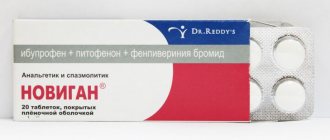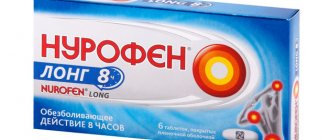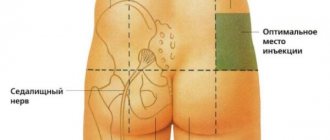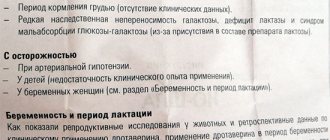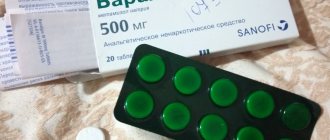Toothache always becomes a source of severe discomfort for a person, disrupts the usual rhythm of life, it becomes difficult to eat food and just sleep, as well as work calmly.
To eliminate unpleasant sensations, modern pharmacology offers a wide variety of medicines. Does Diclofenac help with toothache?
Is it possible to take Diclofenac for toothache?
If a tooth starts to hurt, it is important to find an effective drug as quickly as possible that will help eliminate the problem. In this situation, medications and other therapeutic agents will be relevant.
Currently, several well-known medications are effective for toothache, which have the best analgesic effect. For example, medical experts recommend taking Diclofenac for toothache.
The medication is considered a powerful remedy with a strong analgesic effect. It will help you cope with pain of various origins in a short time, which will allow you to wait for an appointment with the dentist without unnecessary anxiety.
The medicine not only eliminates pain, but also prevents the spread of inflammation that has engulfed the affected tooth. What reviews are there about Diclofenac tablets for toothache? We'll talk about this at the end of the article.
Extra remedies for severe toothache
The heavy artillery of painkillers - tablets Ketanov, Nimesulide, Tempalgin and Flamidez - should be used only in extreme cases, when toothache is truly unbearable. For example, with acute pulpitis and periodontitis, inflammation of the trigeminal nerve - diseases that are characterized by attacks of pulsating, severe dentalgia at night.
Ketanov
Analogues: Ketorol, Dolak, Ketalgin, Toradol
One of the strongest painkillers, ketorolac (the active ingredient of Ketanov tablets) is used in the postoperative period, for injuries and severe toothache caused by periodontitis, pericoronitis or pulpitis.
Like other NSAIDs, ketorolac blocks the production of pain enzymes - prostaglandins, but slows down kidney function. Less blood is filtered and more harmful substances accumulate in the body, so people with kidney failure should not take Ketanov.
A single dose of the drug is 1 tablet of 10 mg, for severe pain, take every 4-6 hours, but not more than 90 mg, 9 tablets per day.
Tempalgin
Analogues: Analgin, Baralgin
The active ingredient in “green tablets” is metamizole sodium, which has a strong analgesic and weak anti-inflammatory effect.
Tempalgin also contains a tranquilizer - the sedative tempidon, which will help you relax and fall asleep after an exhausting attack of toothache at night.
By the way, metamizole sodium does not irritate the gastric mucosa and does not affect water-salt metabolism in the body. Therefore, it is suitable for elderly people and patients prone to gastrointestinal disorders.
Flamidez
A combined drug from the NSAID group, it consists of the analgesics diclofenac and paracetamol, as well as the decongestant serratiopeptidase.
Flamidez has a powerful analgesic, anti-inflammatory effect, and helps relieve swelling. Dentists prescribe Flamidez tablets to relieve pain after tooth extraction, in the complex treatment of alveolar abscesses, purulent inflammation in the root periosteum.
Dosage – 1 tablet twice or thrice a day.
Nimesulide
Analogues: Nise, Nimid
A synthetic drug from the NSAID group with strong analgesic, anti-inflammatory and antipyretic properties.
A Nimesulide tablet can be taken in case of acute pain, during a night attack of dentalgia, after tooth extraction and radiating pain due to inflammation of the trigeminal nerve.
The drug does not have a toxic effect with long-term use and is often prescribed to older people. The exception is patients with heart failure, bronchial asthma and liver disease - they cannot take Nimesulide.
All strong analgesics are prohibited for children under 14 years of age, pregnant and lactating women.
We suggest you read: Sonic toothbrush – rating 2020, reviews from dentists, price
It is impossible to experiment and combine the use of several drugs per day - for example, Aspirin tablets, and after 4 hours Ketanov, according to the principle of “what is more effective”! This can cause hepatic coma and kidney dysfunction.
If the budget for “symptomatic therapy” is tight, take tablets from the “list of necessary and vital medicines of the Russian Federation”: Paracetamol (about 40 rubles), Ibuprofen (38 rubles), Acetylsalicylic acid (from 20 rubles) or Ketorolac (26 rubles).
Drugs from foreign manufacturers will cost more: Nise - from 200 rubles, Aspirin Cardio - from 80 rubles, Tempalgin - 130 rubles, Ketanov - about 60 rubles, Nurofen - 90 rubles.
All medications have contraindications. Before use, carefully read the instructions and consult your doctor.
An analgesic will relieve you of toothache for several hours, but will not eliminate its cause. Only a good dentist can do this. We recommend contacting him in order to avoid the recurrence of even more severe attacks of dentalgia.
Release form
The drug is available in several forms:
- pills;
- suppositories;
- solution;
- ointment;
- gel.
Enteric-coated capsules are orange or yellow in color and round in shape. The tablets are packaged in contour cells of ten pieces. In total, the package can contain one, two, three, five and ten blisters. In addition, the capsules are also packaged in glass jars.
The solution for intramuscular administration is colorless to slightly yellow and has a faint aroma of benzyl alcohol. The drug is dispensed in three milliliter ampoules. The medicine is packaged in contour cells of five pieces, there are two in total in the package.
Ointment for external use is almost white or milky in color, with a specific odor. The medication is produced in aluminum tubes of thirty grams.
Rectal suppositories are torpedo-shaped. Suppositories are white or milky in color. The drug is packaged in blisters of five suppositories, with a total of ten in the package.
The active microelement - diclofenac, is contained in Diclofenac medications in various release forms, be it suppositories or tablets. For toothache, it is recommended to use rectal suppositories rather than tablets.
Compound
One coated tablet contains one active microelement - diclofenac sodium, at a dosage of twenty-five milligrams.
Additional substances are:
- lactose monohydrate;
- sucrose;
- povidone;
- starch;
- octadecanoic acid.
The shell includes the following components:
- cellacephate;
- liquid paraffin;
- titanium dioxide;
- medical castor oil;
- dye.
One milliliter of solution for intramuscular administration contains:
- active microelement - diclofenac sodium (twenty-five milligrams);
- hexahydric alcohol;
- propylene glycol;
- phenylcarbinol;
- caustic soda;
- sodium sulfide;
- water.
One rectal suppository includes:
- diclofenac sodium – one hundred milligrams;
- hard fat.
Indications
The drug helps eliminate not only toothache, it also copes well with pain of other etiologies. It is most often used for problems with the musculoskeletal system.
Diclofenac is a drug for complex therapy, eliminating the inflammatory process and pain, but, unfortunately, it does not have a positive effect on the general course of the disease.
The medication effectively helps eliminate unpleasant symptoms in the following conditions:
- Toothache.
- Ossalgia (bone pain).
- Myalgia (pain in the muscles).
- Radiculitis (damage to the spinal cord roots, causing motor, autonomic and pain disorders).
- Headache.
- Lumbago.
- Neuralgia (inflammation of the peripheral nerves, which is characterized by pain in any nerve).
Severe discomfort requires drastic measures! How effective are injections for toothache?
Toothache is a symptom that occurs due to inflammatory processes in the oral cavity, caries, pulpitis, after removal or treatment of teeth, as well as due to inflammation of the middle ear, migraine, trigeminal neuralgia.
Toothache causes a lot of trouble for a person: headaches appear, performance decreases, and irritability increases.
Therefore, painkillers, especially in the form of injections, are relevant for patients who spend a lot of time at work, as well as those who are particularly sensitive.
For what other diseases is Diclofenac used?
The drug is used in the presence of the following negative conditions:
- Pain syndrome of post-traumatic or postoperative origin.
- Protrusion (pathology of the intervertebral disc, in which it protrudes beyond the vertebrae).
- Herniated intervertebral discs.
- Sciatica (pain in the area of the sciatic nerve).
- Gout (a chronic metabolic disease characterized by impaired purine metabolism and the inability of the kidneys to excrete uric acid).
- Osteoarthritis (a joint disease caused by damage to the cartilage tissue of the articular surfaces).
- Neuritis (an inflammatory disease of the peripheral nerves, in which, along with pain, so-called loss is detected, that is, loss or decrease in sensitivity).
Diclofenac injections will help with toothache.
Contraindications
"Diclofenac" in the form of tablets and suppositories is prohibited from use when the following conditions occur:
- When bronchial asthma occurs (a chronic inflammatory process of the respiratory tract involving a variety of cellular microelements).
- Recurrent polyposis of the paranasal sinuses and nose (benign growth of mucous tissue).
- With active gastrointestinal bleeding.
- Intestinal inflammation (a pathology that often occurs when the principles of a healthy diet are not followed in people with a predisposition to digestive disorders).
- For stomach ulcers.
- Severe renal failure.
- Progressive kidney diseases.
- Hyperkalemia (a pathological condition that causes an abnormally high concentration of potassium in the blood).
- The period after surgery performed to restore blood flow in the arteries.
- Diseases of the heart and blood vessels.
- Pregnancy and lactation.
- Sensitivity to trace elements of the drug, as well as to other non-steroidal anti-inflammatory drugs.
For what other ailments is the use of Diclofenac contraindicated?
Additional prohibitions are:
- Impaired absorption of glucose-galactose (hereditary syndrome caused by impaired absorption of monosaccharides in the gastrointestinal tract).
- Hereditary lactose intolerance (hereditary metabolic pathology, in which there is a decrease in the level and activity of lactase).
- Lactase deficiency (is a syndrome that occurs as a result of interruption of lactase and is accompanied by watery diarrhea).
- Proctitis (inflammatory process in the mucous membrane of the rectal cavity).
"Diclofenac" in tablet form should be used with extreme caution for the following ailments and conditions:
- Patients of retirement age.
- Weakened patients and people with low weight.
- Crohn's disease (a chronic disease of unknown origin, which is characterized by an inflammatory process with segmental damage to the digestive organs).
- Ulcerative colitis (inflammation of the mucous membrane of the colon).
- Hepatic porphyria (hereditary disorder of pigment metabolism with an increased content of porphyrins in the blood and tissues).
- Arterial hypertension (persistent increase in blood pressure).
- Chronic heart failure.
- Severe decrease in circulating blood volume.
- Cardiac ischemia.
- Cerebrovascular diseases (brain damage, which is caused by gradual tissue inflammation against the background of chronic microcirculation disorders).
- Dyslipidemia (active formation of fats, excessive intake from food).
- Hyperlipidemia (severely elevated levels of lipoproteins in the blood).
- Diabetes mellitus (metabolic disorder, which is based on a lack of insulin and an increase in glucose levels).
Caution also requires the combined use of Diclofenac in ampoules for toothache with glucocorticosteroids, anticoagulants, antiplatelet agents, selective serotonin reuptake inhibitors and long-term use of non-steroidal anti-inflammatory drugs.
Side effects from diclofenac injections
During clinical studies, multiple side effects of Diclofenac were identified; when used in the form of injections, the following were most often found:
- hypersensitivity reactions, anaphylaxis, pseudoallergy;
- drop in blood pressure;
- headache, vertigo, constant sleepiness;
- acute form of coronary artery disease, decreased heart function, heart attack;
- palpitations, chest pain;
- bronchial asthma;
- abdominal pain, dyspepsia, nausea;
- inflammation of the gastric mucosa, vomiting mixed with bloody discharge, black semi-liquid stools, bleeding into the cavity of the gastrointestinal tract;
- increased activity of the ALT enzyme in the blood, indicating problems with the liver, hepatitis;
- skin rashes, itching;
- swelling, lump at the injection site, discomfort.
We invite you to familiarize yourself with Techniques to quickly relieve acute tooth pain at home
Restrictions on the use of the solution
Contraindications to the use of Diclofenac in the form of a solution for intramuscular administration are:
- Ulcer of the gastrointestinal tract.
- Problems in the hematopoietic system.
- “Aspirin” asthma (one of the types of bronchial asthma, it occurs when using drugs based on acetylsalicylic acid).
- Pregnancy.
- Breast-feeding.
- Age up to fifteen years.
- Sensitivity to trace elements of the solution.
The solution should be used with particular caution by people of retirement age, as well as those with heart failure, severe impairment of the kidneys and liver.
Other painkillers
Not any anesthesia can be used when extracting a tooth. In dentistry, only the most common and effective medications are used. And almost every hospital has Novocaine.
But in modern treatment, novocaine is used much less frequently. If previously not a single operation could be done without it, now this drug causes an allergic reaction in most people.
It has a number of side effects:
- dizziness;
- lethargy;
- lowering blood pressure.
Today there are more intense anesthetics, and therefore novocaine is used only in combination. It is injected into the body with a small dose of adrenaline. In combination, these drugs have the best analgesic functions. But such a mixture should not be prescribed to people whose blood pressure is off the charts.
For infiltration anesthesia, a 0.5% lidocaine solution is used. This drug can be used for the conduction method; only a 1–2% solution is required. For an adult, the norm is 300–400 mg.
Side effects of this medicine include:
- headache;
- fatigue;
- loss of sensation in the lips and tongue;
- heart rhythm is disturbed;
- blood pressure decreases;
- there may be hives.
The most modern anesthesia is a medicine based on the substance articaine. Such drugs can provide long-term and reliable pain relief. It is used by a large number of dental surgeons. The substance reaches its maximum effect after 10 minutes and maintains its result for 1–3.5 hours.
But no matter how good the drug is, it always has side effects:
- muscle twitching;
- headache;
- tremor;
- nausea;
- vomiting reflex;
- diarrhea.
These are the most common side effects. But sometimes others happen:
- blood pressure decreases;
- cardiac arrhythmia is disturbed;
- rashes appear on the skin;
- angioedema may occur.
These painkillers cannot be used for meningitis, tumors, osteochondrosis, spondylitis, tuberculosis, metastatic lesions of the spine, heart failure, tumors in the abdominal area, severe arterial hypotension, and hemostasis disorders. Use with caution during pregnancy. The drug may cause a decrease in the fetal heart rate.
A very good drug based on articaine is Ubistezin. It also contains adrenaline. It reduces blood vessels in the area where anesthesia was administered. This makes it difficult to absorb the substance. As a result, the analgesic effect begins to act within 3 minutes.
Attention! If you want to purchase a cheaper analogue of the described drugs, you should keep in mind that they do not always work as well and can be tolerated differently by the same patient.
We invite you to read: Which removable dentures are better - reviews, new generation without palate
This medication belongs to the group of anti-inflammatory non-steroidal drugs derived from phenylacetic acid. It has a pronounced antipyretic and analgesic effect. Indicated in cases such as:
- postoperative pain;
- primary dysmenorrhea;
- bursitis;
- radiculitis;
- tendinitis;
- lumbago;
- neuritis;
- neuralgia;
- gout;
- spondyloarthrosis;
- injuries to the musculoskeletal system;
- arthrosis;
- rheumatoid arthritis;
- Bekhterev's disease;
- rheumatism.
An injection with Diclofenac is not recommended for a patient if:
- acute rhinitis;
- children under 7 years old;
- hives;
- bronchial asthma;
- hypersensitivity to medication substances;
- during lactation;
- in the last 3 months of pregnancy;
- kidney and liver diseases;
- internal bleeding;
- stomach and duodenal ulcers.
The most powerful painkilling injections are given for cancer, especially in its final stages. To do this, doctors prescribe (strictly according to prescription) a narcotic analgesic such as the drug “Morphine Hydrochloride”. If you are concerned about pancreatitis, you can use the following drugs: Odeston, Mebeverine or Dicetel. Among other things, such well-known medicines as “No-shpa” and “Papaverine” are also highly valued.
How to use the drug correctly?
The dosage of "Diclofenac" is selected for each individual in a specific situation purely individually, depending on the characteristics of the condition and severity of the pain syndrome, as well as on the individual indicators of the body.
The drug can be used:
- rectally;
- externally;
- intramuscularly;
- orally.
Instructions for use
“Diclofenac” is a serious medication that is recommended to be used strictly according to the doctor’s recommendations, both for headaches and toothaches. The daily dosage of the active microelement should not exceed one hundred and fifty milligrams; if there is a need for long-term use, then up to one hundred milligrams per day.
It is allowed to take Diclofenac tablets for toothache in adolescents over the age of fourteen years. For them, daily consumption is limited to fifty milligrams, and it is divided into two or three doses.
If a tooth hurts, not everyone is allowed to take the drug. A number of contraindications are prescribed in the instructions for use of Diclofenac.
The drug in tablet form should be taken orally, whole and with water, preferably thirty minutes before meals (to achieve the best pharmacological effect). It is also possible to use the medication before, during or after meals.
For adolescents over fifteen years of age and adult patients, Diclofenac is prescribed two to three times a day, twenty-five to fifty milligrams (maximum one hundred and fifty milligrams per day).
After improvement, the dosage is gradually reduced and switched to maintenance treatment - fifty milligrams per day. To eliminate juvenile rheumatoid arthritis, the daily dosage can be increased to three mg per kilogram of weight. As a rule, Diclofenac is not prescribed for children, but, if necessary, it is recommended in the following dosages:
- Six to seven years (weight approximately twenty to twenty-four kilograms) – twenty-five milligrams per day.
- Children from eight to eleven years old (weighing from twenty-five to thirty-seven kilograms) - one-time twenty-five milligrams, daily up to seventy-five mg.
- For adolescents from twelve to fourteen years old (weight from thirty-eight to fifty kilograms) - a single dosage of twenty to seventy-five mg, daily dosage of up to one hundred milligrams.
Anesthesia doesn't work
There are cases when the anesthesia does not work and the person feels pain. There are several factors why this happens:
- Alcohol. The chemical composition of ethyl alcohol can block the effects of the anesthetic. Therefore, it is not recommended to go to the dentist if you have recently consumed strong drinks.
- Using large amounts of painkillers. If a person is taking medications that contain painkillers, they should not be taken before seeing a doctor.
- A person may have individual immunity to certain anesthetics. This factor is very rare.
If the anesthesia does not work, then it is worth understanding the reason. Having received the result, the treatment is postponed to another day.
In what dosage should I use Diclofenac solution?
The drug in liquid form must be injected deep into the muscle. A single dosage for adult patients is seventy-five milligrams.
If necessary, no earlier than twelve hours later, the procedure can be repeated. Treatment should be carried out for no more than two days, after which you should switch to the tablet form of Diclofenac. Suppositories are administered rectally.
Adult patients are usually recommended to use one hundred to one hundred and fifty milligrams per day, the dosage should be divided into two or three doses. For a long course, the medication is administered at a dose of one hundred mg per day. If rectal suppositories are used in conjunction with tablets, the total amount of active substance should not exceed one hundred and fifty milligrams.
How to inject diclofenac
An injection is made into the upper lateral quadrant of the gluteal muscle, Diclofenac is administered intramuscularly. It is preferable to use a five-milligram syringe with a long needle, which is inserted through the subcutaneous layer into the muscle about three-quarters of its length. The solution is released slowly and systematically, a so-called “long” injection is given. The right and left buttocks alternate when choosing the site for each subsequent injection.
Diclofenac can be injected into a muscle (usually the gluteal muscle) or into a vein. The dosage for an adult at one time is 75 mg (3 ml), the drug is administered to children only from 12 years of age at the same dose. The maximum amount of medication per day is 150 mg, so you can inject only 2 ampoules, but with an interval between injections of several hours (at least 6).
We suggest you familiarize yourself with Pain in the ear when chewing – causes, symptoms, treatment
Opinions
In general, reviews of Diclofenac for toothache confirm the effectiveness of the drug, but at the same time, they indicate that its use often provokes side effects. Therefore, it is necessary to start therapy only after consulting a medical specialist and identifying contraindications.
Most of the patients who were treated with this drug report that the positive effect of using Diclofenac develops quickly - the pain begins to “go away” within thirty minutes.
Does Diclofenac (injections) help with toothache? The drug in the form of a solution not only eliminates toothache, but also has an anti-inflammatory effect.
Severe discomfort requires drastic measures! How effective are injections for toothache?
When toothache occurs, drugs such as Ketorol and Diclofenac provide a quick-acting effect. A solution administered intramuscularly begins to act within 15 to 20 minutes and relieves pain for a period of 3 to 5 hours.
When using the most powerful painkillers, quite serious side effects can occur:
- hives and itching, especially if the patient has any allergies;
- urinary retention, which is especially dangerous for men, since the prostate gland also suffers from this;
- spasmodic pain in the stomach and intestines;
- mental disorders, insomnia and nightmares;
- bleeding from the gastrointestinal tract and its erosion;
- problems with the respiratory system;
- disorders in hematopoiesis, including anemia.
Attention! For your own safety, you should not exceed the daily dose of medications, especially such strong ones as described in this article. At best, you will experience vomiting and abdominal pain, and at worst, problems with the central nervous system and urinary system will appear.
The described medications belong to the group of the most powerful and at the same time are capable of not only quickly extinguishing pain, but also maintaining the result for 6-12 hours. It is worth understanding that they are not designed for long-term use and require a reasonable approach and adherence to therapeutic doses. They should be taken only for acute painful sensations, which can also be associated with complications in the form of fever, abscesses, fluxes, or after surgical procedures.


